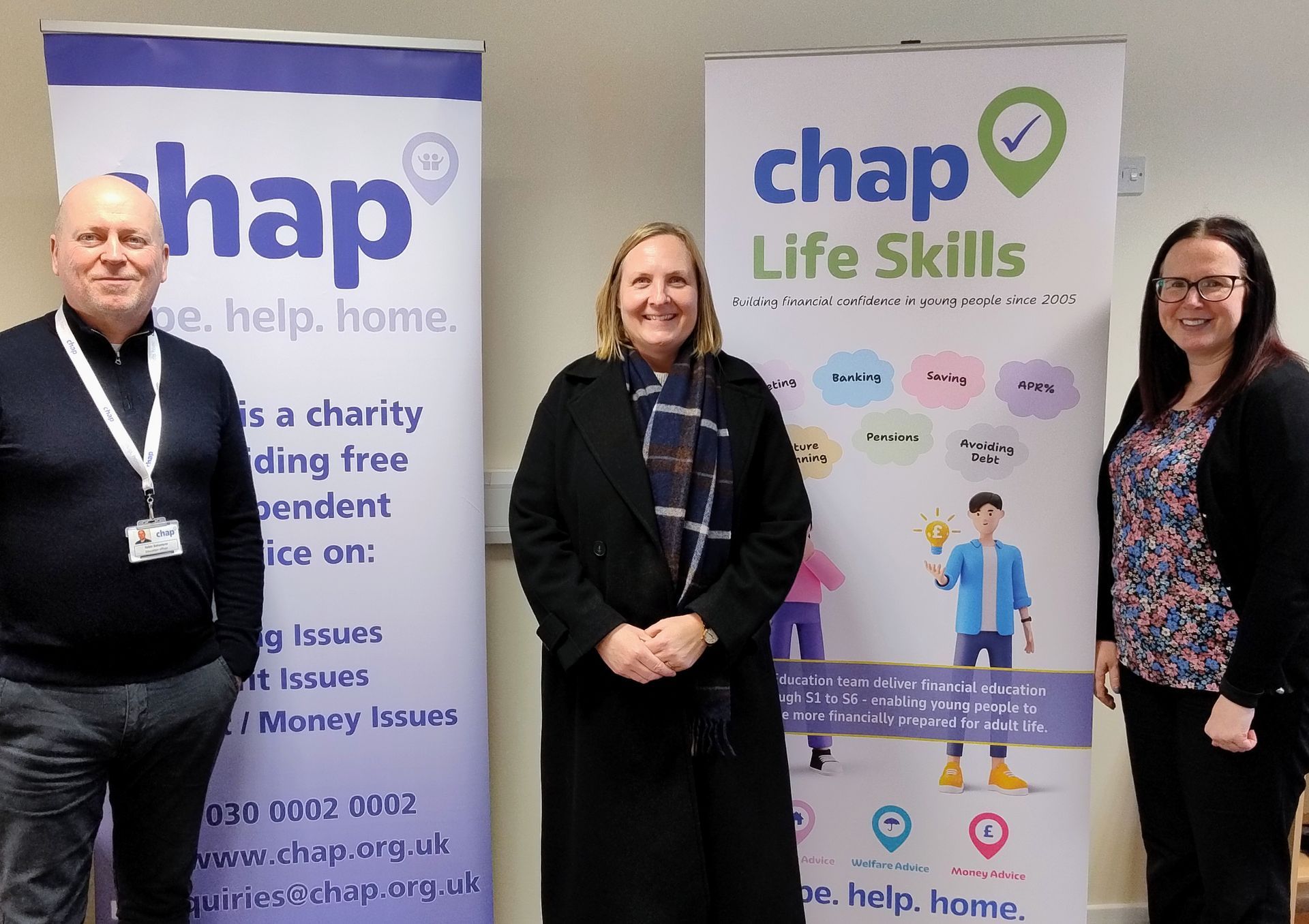We are here to help,
tell us what you need...

Worried about mortgage payments?
The AHAP service provides free financial advice and legal support for homeowners in Ayrshire who are experiencing financial difficulties and are unable to maintain their mortgage payments.
AHAP is a partnership between CHAP and Govan Law Centre and is funded by the Scottish Legal Aid Board.
REFERRALS
To make an appointment with an adviser, or to refer someone, please select the relevant link below.
DONATIONS
What our clients said
Latest News...

You may have seen that recent UK news coverage (including a report highlighted by The Big Issue), has once again shone a light on the strong and damaging link between mental health problems and financial hardship. New research from the Money and Mental Health Policy Institute, founded and chaired by TV's 'money expert' Martin Lewis, shows that more than half of people with mental health problems regularly run out of money, often struggling to cover essential living costs. Crucially, the research also reveals that many people who could be helped by income maximisation services - support that helps people access benefits, grants and discounts they are entitled to - are missing out entirely. Income Maximisation: A Vital but Overlooked Lifeline As highlighted by Helen Undy, Chief Executive of the Money and Mental Health Policy Institute, income maximisation services can be a critical lifeline for people facing financial difficulty. Yet many people have never heard of them, and access to these services is far from equal. The Institute’s research, supported by Barclays, found that income maximisation services are: Overstretched and inconsistently provided across the country Often poorly suited to people with complex needs, including those experiencing mental health difficulties Frequently limited to online tools, rather than personalised support While online benefits calculators can be extremely helpful, they are not always accessible for people dealing with anxiety, depression or other mental health challenges. For many, navigating forms, understanding entitlements and following up claims requires tailored, adviser-led support - something that is simply not available in too many areas. A Postcode Lottery of Support Where someone lives can still determine whether they get meaningful help. The research shows that access to adviser-led income maximisation support varies widely, creating a postcode lottery that leaves many people without the assistance they need. At a recent roundtable launch event in the UK Parliament, policy experts, commissioners and parliamentarians came together to discuss how income maximisation services could be reformed. The event also heard from Rob, an “expert by experience”, who shared how difficult it was to access appropriate support while struggling with his mental health. His testimony underlined just how important it is that services are designed to be truly accessible, compassionate and responsive. Why This Matters for Mental Health Financial stress and mental health problems often reinforce each other. Struggling to make ends meet can worsen anxiety and low mood, while mental health challenges can make it harder to manage money, engage with services or ask for help. Without early and accessible support, people can quickly find themselves in crisis. That’s why the Money and Mental Health Policy Institute is calling on government, commissioners and banks to take action to ensure income maximisation support is available to everyone who needs it - regardless of mental health or location. CHAP Can Help At CHAP, we see these challenges every day. Many of the people who come to us for housing, welfare rights or money advice are also managing mental health difficulties that make dealing with complex systems feel overwhelming. Our fully qualified advisers know that accessing the right benefits, grants or financial support can be life-changing - easing immediate pressure and giving people the breathing space they need to focus on their wellbeing. But as this research shows, too many people are still missing out because support is patchy, hard to access or not designed with mental health in mind. We strongly support calls for better-funded, joined-up and adviser-led income maximisation services. By recognising the clear link between money and mental health, and by investing in accessible support, we can help prevent people from reaching crisis point and ensure no one is left to struggle alone. Get Support If you’re struggling with money, worried about debt, or finding it hard to cope because of financial stress, you don’t have to face it alone. CHAP offers free, confidential and independent advice on welfare benefits, money and debt, housing issues and income maximisation. Our advisers can help you check what you’re entitled to, explore your options and find a way forward at a pace that feels right for you. If you’re supporting someone else and are unsure where to turn, we’re here for you too. Get in touch with CHAP today to speak to an adviser or find out more about our services. Freephone 030 0002 0002

2025 has been another extremely busy year for the team at CHAP, with demand for our services continuing to rise. Over the past year, 2,055 individuals were referred to us for support, highlighting just how vital our services remain within the communities we serve. Alongside this increased demand, the outcomes we have achieved for our clients have reached a record high. In 2025, we secured more than £4.27 million for the people we support - an increase of £1 million compared to our achievements in 2024. This vital income has made a real and lasting difference to the lives of many individuals and families. While the financial impact is significant, the support we provide goes far beyond money alone. Many clients told us that accessing CHAP’s services helped to reduce their stress levels, with 68% reporting a noticeable improvement. Others shared how our support positively influenced their confidence, health, education and employment prospects, as well as helping them to build stronger social connections and enjoy a better overall quality of life.

CHAP is very pleased to announce an exciting partnership with Morgan Sindall Construction that aims to equip secondary school pupils with the financial skills needed to prepare them for life beyond the classroom and into adulthood. Established in 2005, CHAP’s education department has long played a vital role in raising awareness of the realities of homelessness, challenging stereotypes, and highlighting the responsibilities and costs related to independent living to S4 pupils across North Ayrshire. In 2015, this work expanded to include financial education workshops, supporting young people to better understand budgeting, credit rating, saving, and wider money management. Thanks to funding from The Robertson Trust, another milestone was reached earlier in 2025 by extending Life Skills and financial education sessions into S1 - S3 classrooms, giving younger pupils the opportunity to develop good financial habits early and strengthen their money confidence. Morgan Sindall Construction delivers a wide range of major construction projects across the UK including primary and secondary schools, colleges and universities. As part of the Morgan Sindall Group, they are committed to making a positive difference within the communities they work in as part of their responsible business plan. One such project is the new Dumfries High School that is currently under construction and scheduled to open in late Spring 2026. To complement and support their investment in apprenticeships and the young workforce, Morgan Sindall Construction has funded CHAP to engage with pupils at the existing Dumfries High School, St Joseph’s College, North West Community Campus, and Dumfries Academy to deliver a comprehensive programme of financial literacy sessions. These interactive sessions cover essential money skills including budgeting, saving, understanding credit, and the real-life cost of everyday living. Feedback from both staff and pupils has been extremely positive, with CHAP already seeing strong engagement and enthusiasm from the young people taking part. Robin Ballantyne, Senior Education Officer at CHAP, said: “We’re delighted to be working alongside Morgan Sindall Construction on this important initiative. Giving young people the tools and confidence to manage their money is vital, particularly as they prepare for life beyond school. This partnership allows us to reach new communities and build long-term impact while Morgan Sindall delivers transformational educational facilities across the region.” Elizabeth Halliday, Head of Responsible Business (Scotland) at Morgan Sindall Construction said: “Creating long-term value for communities goes hand in hand with the schools we build. Partnering with CHAP helps us strengthen our social value commitments by offering young people meaningful skills that will support them into adulthood and the workplace.” This partnership reflects a shared ambition to improve outcomes for people living in the communities served by both parties. By working together, CHAP and Morgan Sindall Construction are laying the foundations for long-term support for young people to gain confidence in their financial and everyday life skills. For more information about Morgan Sindall Construction, please visit: www.morgansindallconstruction.com





